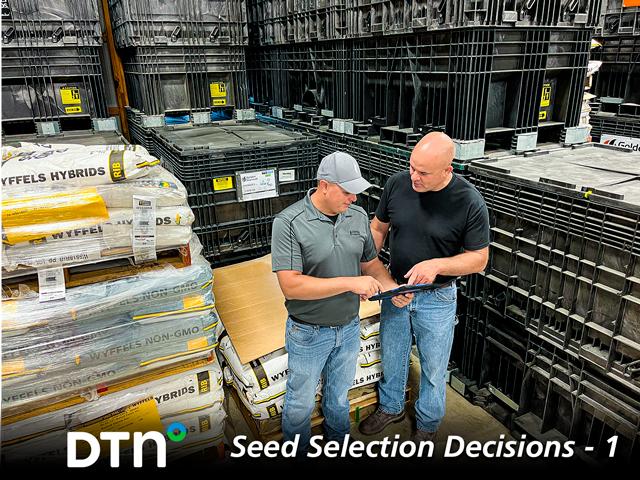Seed Dealers More Important Than Ever


FARMER-DEALER BENEFITS
Buford’s dad was a Burrus Seed dealer for 25 years in northeast Missouri. He followed in his father’s footsteps, selling the Burrus brands for five years before switching exclusively to Golden Harvest in 2013. Five years ago, Buford added Wyffels Hybrids to his seed dealership, and it now represents the majority of what he sells.
“Selling multiple brands allows me to gather more information on what is happening throughout the seed industry and hopefully bring those resources back to my customers,” he says.
The 34-year-old also farms full-time, contrary to the model embraced by many in the industry. Buford believes his dual role gives him added credibility with customers.
“I take things a bit more personally because I’m in their shoes,” he said. “There’s a lot more on the line today than there was 30 years ago. It’s rewarding when the hybrids and varieties I recommend result in their success, and you also feel responsible when they don’t have success.”
Buford’s curiosity on how to get more out of a crop fits well with the added demands from his seed customers. He likes the challenge of putting together the pieces of the puzzle that increase yield and shares what he learns on his own farm with customers.
“I try to emphasize my recommendations based on facts, data and experience, not on sales,” Buford stressed. “I make my living farming, and I also sell seed. I’m not going to recommend a hybrid, variety or production practice without the grower’s best interest in mind.”
All seed companies strive for their dealers to have that same level of commitment and trust with their customers. “Farmers still rely on a dealer that can help them grow their business. They want somebody that cares about them and their business,” noted Scott Greenfield, DeKalb Asgrow Deltapine distribution manager. “And, while the scope of knowledge, service and support a dealer provides has changed tremendously, the part that really hasn’t changed is the value of that relationship and the trust that goes with it. That’s earned.”
Kevin Ross agreed. “Everybody has good hybrids,” pointed out the Kahoka, Missouri, farmer. “It goes back to the dealer. It’s who you trust. Who is going to do a good job for you and go to bat for you?”
Buford is one of two seed dealers upon which Ross relies. Ross looks for someone who sells a quality product that performs well in his soils and growing environment, and is available to provide advice throughout the growing season.
“Brian is constantly checking with us and monitoring our crops’ progress,” Ross explained. “He’s out scouting his own fields for potential problems. If he sees an issue, he alerts us and is out in our fields to determine if any action is required. We also rely on his knowledge on whether certain hybrids respond to extra nitrogen or a fungicide, for example, to help us decide if an application will pay.”
Adding value beyond the seed in the bag is important to Buford. He said that value comes in many forms such as advice on planting population, specialized technology, soils, crop protection, equipment, data analysis and marketing.
“I feel like it’s my responsibility as their seed supplier to pool as many resources as possible relative to what issues may arise during the growing season,” Buford said. “Staying ahead of potential challenges is the best way to ensure that both myself and my customers have success.”
CONSTANT TRAINING
Providing dealers with that level of expertise and knowledge is a high priority for seed companies. Training and education come in many forms, ranging from field days to see firsthand product performance; sessions with company agronomists to learn about the latest crop-production and management practices; deep dives on the launch of new traits and seed numbers; updates during the growing season on potential crop problems and more.
“What we’re trying to do is enable our seed dealers and our seed sellers, regardless of the channel they participate in, to be informed to help their farmer customers. We want to empower them to anticipate questions from farmers and any hybrid and variety performance issues that may arise,” Corteva’s Miller pointed out.
DEALER OF THE FUTURE
In the highly competitive seed industry, those ever-changing questions challenge companies to constantly look for ways for their dealers to better serve farmers.
“There is going to be a much larger need for farmers to get even better information from their dealers as well as the seed companies,” Bayer’s Greenfield explained. “That will include greater transparency in areas like logistics so they can track their own seed order and delivery dates. Dealers will need to integrate more data to not only help farmers make the right seed choices but also all the other crop inputs to optimize performance.”
Syngenta’s Boeck agreed. “Dealers will need to be able to communicate with the farmer in their digital ecosystem. The digital revolution offers every farmer layers of data. Dealers will need to understand that data and provide insights and solutions on not only the seed growers select, but the entire agronomic spectrum on every acre.”
Ross looks for those same insights from Buford on his Missouri farm. But, he also knows his success begins with the basics. “You essentially get one shot to get it right each year, and it starts with the seed. Brian is not only our dealer but also a trusted partner and friend. For me, the relationship and trust are everything.”
To see six tips to get the most from seed dealers, go to https://www.dtnpf.com/….
Gregg Hillyer can be reached at Gregg.hillyer@dtn.com
Follow him on Twitter @GreggHillyer
(c) Copyright 2022 DTN, LLC. All rights reserved.





